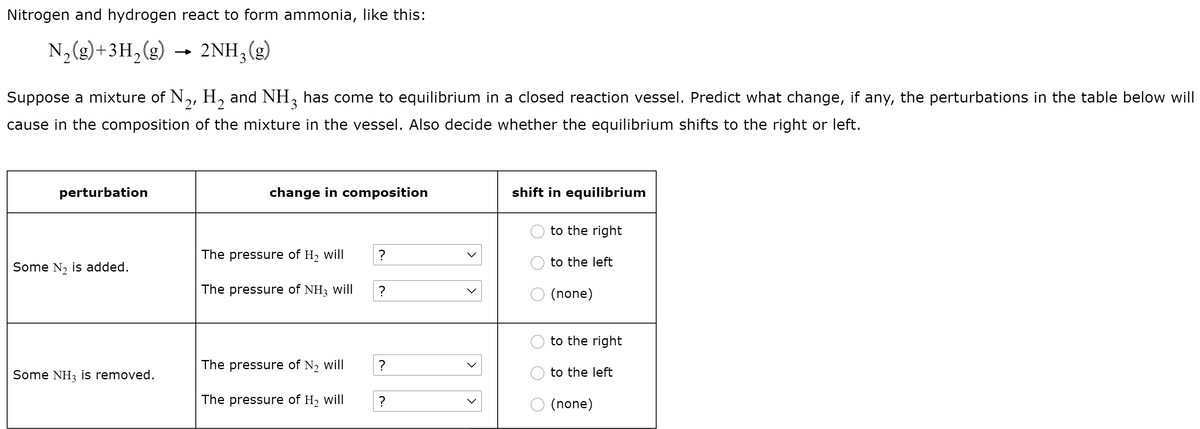N,(2)+3H,(g) → 2NH;(g) uppose a mixture of N,, H, and NH, has come to equilibrium in a closed reaction vessel. Predict what change, if any, the perturbations in the table belov ause in the composition of the mixture in the vessel. Also decide whether the equilibrium shifts to the right or left. perturbation change in composition shift in equilibrium to the right The pressure of H2 will ? Fome N, is added. to the left The pressure of NH3 will ? (none) to the right The pressure of N2 will ? Fome NH3 is removed. to the left The pressure of H2 will ? (none)
N,(2)+3H,(g) → 2NH;(g) uppose a mixture of N,, H, and NH, has come to equilibrium in a closed reaction vessel. Predict what change, if any, the perturbations in the table belov ause in the composition of the mixture in the vessel. Also decide whether the equilibrium shifts to the right or left. perturbation change in composition shift in equilibrium to the right The pressure of H2 will ? Fome N, is added. to the left The pressure of NH3 will ? (none) to the right The pressure of N2 will ? Fome NH3 is removed. to the left The pressure of H2 will ? (none)
Principles of Modern Chemistry
8th Edition
ISBN:9781305079113
Author:David W. Oxtoby, H. Pat Gillis, Laurie J. Butler
Publisher:David W. Oxtoby, H. Pat Gillis, Laurie J. Butler
Chapter14: Chemical Equilibrium
Section: Chapter Questions
Problem 89AP
Related questions
Question
Nitrogen and hydrogen react to form ammonia, like this:
N2(g)+3H2(g)→ 2NH3(g)
Suppose a mixture of N2, H2 and NH3 has come to equilibrium in a closed reaction vessel. Predict what change, if any, the perturbations in the table below will cause in the composition of the mixture in the vessel. Also decide whether the equilibrium shifts to the right or left.

Transcribed Image Text:Nitrogen and hydrogen react to form ammonia, like this:
N,(g)+3H,(g) → 2NH;(g)
Suppose a mixture of N,,
H, and NH, has come to equilibrium in a closed reaction vessel. Predict what change, if any, the perturbations in the table below will
cause in the composition of the mixture in the vessel. Also decide whether the equilibrium shifts to the right or left.
perturbation
change in composition
shift in equilibrium
to the right
The pressure of H2 will
to the left
Some N, is added.
The pressure of NH3 will
?
O (none)
to the right
The pressure of N2 will
?
Some NH3 is removed.
to the left
The pressure of H2 will
(none)
Expert Solution
This question has been solved!
Explore an expertly crafted, step-by-step solution for a thorough understanding of key concepts.
This is a popular solution!
Trending now
This is a popular solution!
Step by step
Solved in 3 steps

Knowledge Booster
Learn more about
Need a deep-dive on the concept behind this application? Look no further. Learn more about this topic, chemistry and related others by exploring similar questions and additional content below.Recommended textbooks for you

Principles of Modern Chemistry
Chemistry
ISBN:
9781305079113
Author:
David W. Oxtoby, H. Pat Gillis, Laurie J. Butler
Publisher:
Cengage Learning

Chemistry: The Molecular Science
Chemistry
ISBN:
9781285199047
Author:
John W. Moore, Conrad L. Stanitski
Publisher:
Cengage Learning

Chemistry: Principles and Practice
Chemistry
ISBN:
9780534420123
Author:
Daniel L. Reger, Scott R. Goode, David W. Ball, Edward Mercer
Publisher:
Cengage Learning

Principles of Modern Chemistry
Chemistry
ISBN:
9781305079113
Author:
David W. Oxtoby, H. Pat Gillis, Laurie J. Butler
Publisher:
Cengage Learning

Chemistry: The Molecular Science
Chemistry
ISBN:
9781285199047
Author:
John W. Moore, Conrad L. Stanitski
Publisher:
Cengage Learning

Chemistry: Principles and Practice
Chemistry
ISBN:
9780534420123
Author:
Daniel L. Reger, Scott R. Goode, David W. Ball, Edward Mercer
Publisher:
Cengage Learning

Chemistry: Principles and Reactions
Chemistry
ISBN:
9781305079373
Author:
William L. Masterton, Cecile N. Hurley
Publisher:
Cengage Learning

Introductory Chemistry: A Foundation
Chemistry
ISBN:
9781285199030
Author:
Steven S. Zumdahl, Donald J. DeCoste
Publisher:
Cengage Learning

Chemistry by OpenStax (2015-05-04)
Chemistry
ISBN:
9781938168390
Author:
Klaus Theopold, Richard H Langley, Paul Flowers, William R. Robinson, Mark Blaser
Publisher:
OpenStax